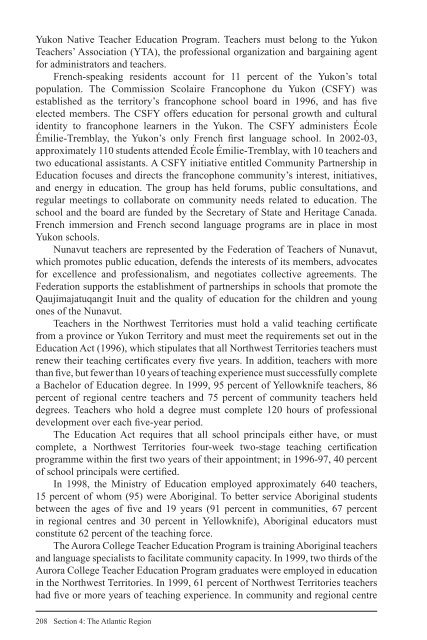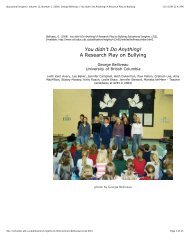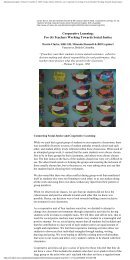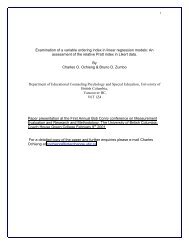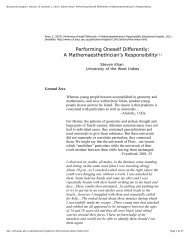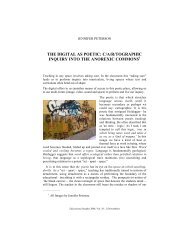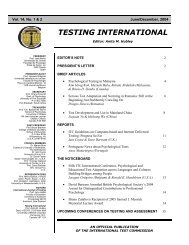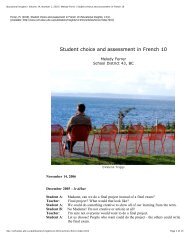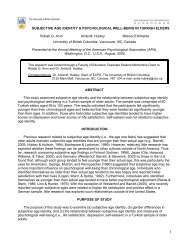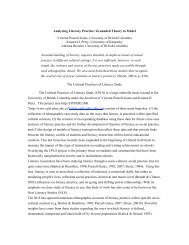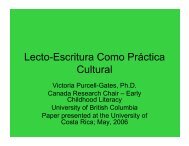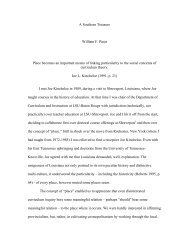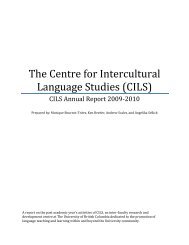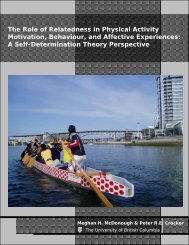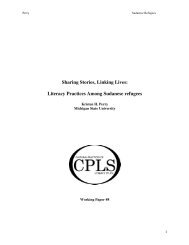The evolution of professionalism - Centre for Policy Studies in ...
The evolution of professionalism - Centre for Policy Studies in ...
The evolution of professionalism - Centre for Policy Studies in ...
Create successful ePaper yourself
Turn your PDF publications into a flip-book with our unique Google optimized e-Paper software.
Yukon Native Teacher Education Program. Teachers must belong to the Yukon<br />
Teachers’ Association (YTA), the pr<strong>of</strong>essional organization and barga<strong>in</strong><strong>in</strong>g agent<br />
<strong>for</strong> adm<strong>in</strong>istrators and teachers.<br />
French-speak<strong>in</strong>g residents account <strong>for</strong> 11 percent <strong>of</strong> the Yukon’s total<br />
population. <strong>The</strong> Commission Scolaire Francophone du Yukon (CSFY) was<br />
established as the territory’s francophone school board <strong>in</strong> 1996, and has fi ve<br />
elected members. <strong>The</strong> CSFY <strong>of</strong>fers education <strong>for</strong> personal growth and cultural<br />
identity to francophone learners <strong>in</strong> the Yukon. <strong>The</strong> CSFY adm<strong>in</strong>isters École<br />
Émilie-Tremblay, the Yukon’s only French fi rst language school. In 2002-03,<br />
approximately 110 students attended École Émilie-Tremblay, with 10 teachers and<br />
two educational assistants. A CSFY <strong>in</strong>itiative entitled Community Partnership <strong>in</strong><br />
Education focuses and directs the francophone community’s <strong>in</strong>terest, <strong>in</strong>itiatives,<br />
and energy <strong>in</strong> education. <strong>The</strong> group has held <strong>for</strong>ums, public consultations, and<br />
regular meet<strong>in</strong>gs to collaborate on community needs related to education. <strong>The</strong><br />
school and the board are funded by the Secretary <strong>of</strong> State and Heritage Canada.<br />
French immersion and French second language programs are <strong>in</strong> place <strong>in</strong> most<br />
Yukon schools.<br />
Nunavut teachers are represented by the Federation <strong>of</strong> Teachers <strong>of</strong> Nunavut,<br />
which promotes public education, defends the <strong>in</strong>terests <strong>of</strong> its members, advocates<br />
<strong>for</strong> excellence and pr<strong>of</strong>essionalism, and negotiates collective agreements. <strong>The</strong><br />
Federation supports the establishment <strong>of</strong> partnerships <strong>in</strong> schools that promote the<br />
Qaujimajatuqangit Inuit and the quality <strong>of</strong> education <strong>for</strong> the children and young<br />
ones <strong>of</strong> the Nunavut.<br />
Teachers <strong>in</strong> the Northwest Territories must hold a valid teach<strong>in</strong>g certifi cate<br />
from a prov<strong>in</strong>ce or Yukon Territory and must meet the requirements set out <strong>in</strong> the<br />
Education Act (1996), which stipulates that all Northwest Territories teachers must<br />
renew their teach<strong>in</strong>g certifi cates every fi ve years. In addition, teachers with more<br />
than fi ve, but fewer than 10 years <strong>of</strong> teach<strong>in</strong>g experience must successfully complete<br />
a Bachelor <strong>of</strong> Education degree. In 1999, 95 percent <strong>of</strong> Yellowknife teachers, 86<br />
percent <strong>of</strong> regional centre teachers and 75 percent <strong>of</strong> community teachers held<br />
degrees. Teachers who hold a degree must complete 120 hours <strong>of</strong> pr<strong>of</strong>essional<br />
development over each fi ve-year period.<br />
<strong>The</strong> Education Act requires that all school pr<strong>in</strong>cipals either have, or must<br />
complete, a Northwest Territories four-week two-stage teach<strong>in</strong>g certifi cation<br />
programme with<strong>in</strong> the fi rst two years <strong>of</strong> their appo<strong>in</strong>tment; <strong>in</strong> 1996-97, 40 percent<br />
<strong>of</strong> school pr<strong>in</strong>cipals were certifi ed.<br />
In 1998, the M<strong>in</strong>istry <strong>of</strong> Education employed approximately 640 teachers,<br />
15 percent <strong>of</strong> whom (95) were Aborig<strong>in</strong>al. To better service Aborig<strong>in</strong>al students<br />
between the ages <strong>of</strong> fi ve and 19 years (91 percent <strong>in</strong> communities, 67 percent<br />
<strong>in</strong> regional centres and 30 percent <strong>in</strong> Yellowknife), Aborig<strong>in</strong>al educators must<br />
constitute 62 percent <strong>of</strong> the teach<strong>in</strong>g <strong>for</strong>ce.<br />
<strong>The</strong> Aurora College Teacher Education Program is tra<strong>in</strong><strong>in</strong>g Aborig<strong>in</strong>al teachers<br />
and language specialists to facilitate community capacity. In 1999, two thirds <strong>of</strong> the<br />
Aurora College Teacher Education Program graduates were employed <strong>in</strong> education<br />
<strong>in</strong> the Northwest Territories. In 1999, 61 percent <strong>of</strong> Northwest Territories teachers<br />
had fi ve or more years <strong>of</strong> teach<strong>in</strong>g experience. In community and regional centre<br />
208 Section 4: <strong>The</strong> Atlantic Region


